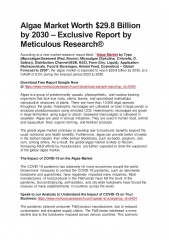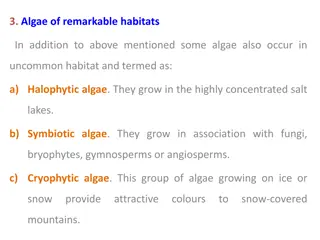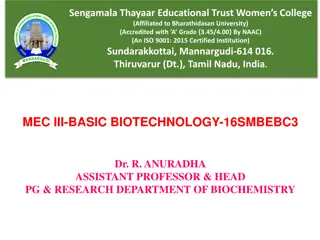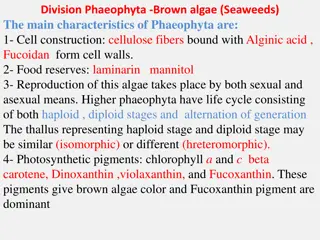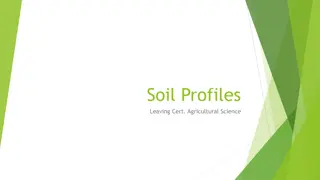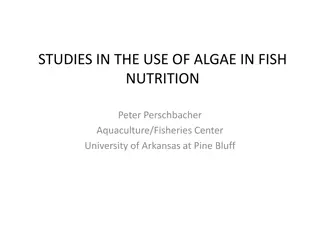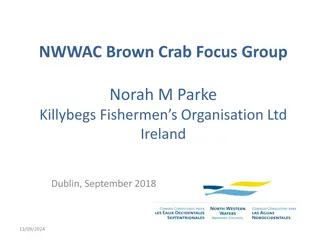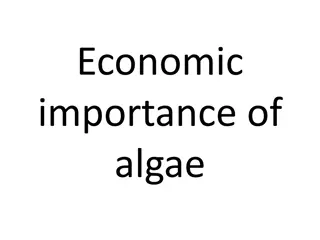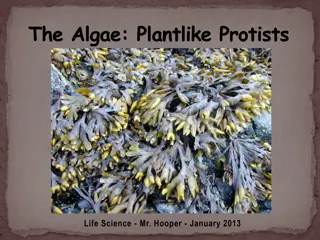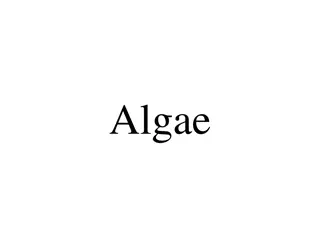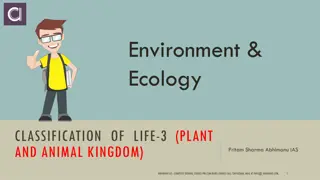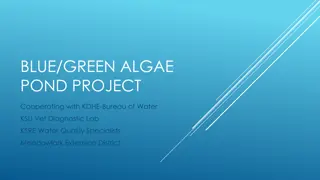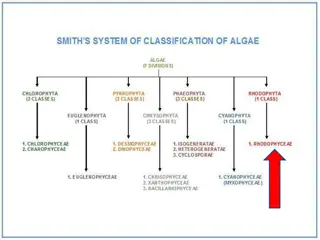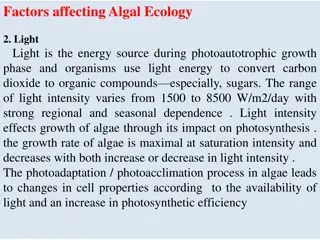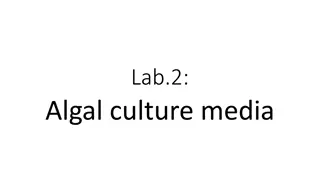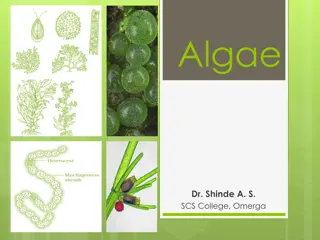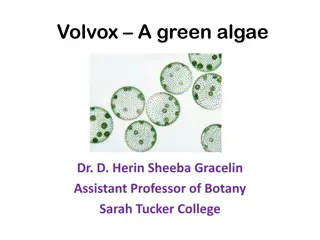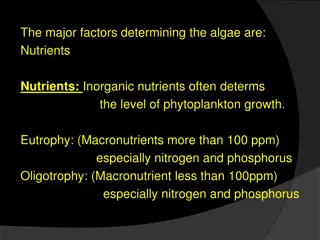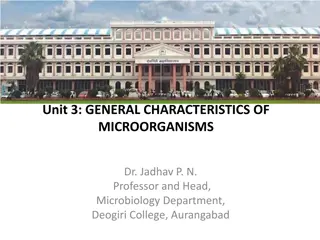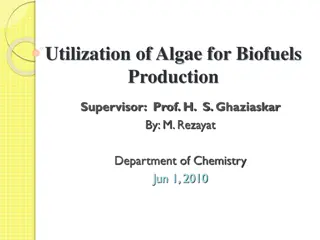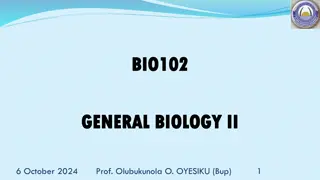One of the Best Brown Sugar Boba in Ivory Highlands
Tea & Brown offers the Best Brown Sugar Boba in Ivory Highlands. From classic milk teas to exotic fruit blends, their menu offers something to satisfy every craving. Whether you're looking for a quick pick-me-up or a leisurely afternoon treat, they are here to elevate your tea-drinking experience. C
0 views • 6 slides
Brown Act Basics for Housing Element Working Group
The Housing Element Working Group held a meeting on May 6, 2021, focusing on key topics such as Introduction to Brown Act, Housing Element 101, Working Group Processes, and Election of Co-Chairs. Housekeeping items were highlighted, emphasizing clear communication and technological flexibility. The
0 views • 37 slides
Algae Diversity: Habitats and Classification
Algae exhibit remarkable diversity in habitats, including halophytic algae in salt lakes, symbiotic algae with various organisms, cryophytic algae on ice, thermophytes in hot springs, and more. They are classified into different groups based on pigmentation, storage products, and cellular organizati
0 views • 22 slides
Understanding Brown Earth Soil Formation in Temperate Broadleaved Forests
Brown Earth soils are characteristic of temperate broadleaved deciduous forests in regions like Western Europe, Russia, and North America. Deciduous trees contribute to the formation of these soils by providing a rich leaf litter that breaks down rapidly due to the mild climate. Soil organisms play
1 views • 17 slides
Understanding Blue-Green Algae: Cultivation, Nutrient Composition, and Properties
Blue-green algae, also known as cyanobacteria, are photosynthetic bacteria that thrive in warm, nutrient-rich water bodies. They are packed with essential nutrients like vitamins, minerals, and amino acids, making them a valuable resource for overall health. Learn about the cultivation, uses, and hi
1 views • 21 slides
The Impact of John Brown's Raid on Harper's Ferry in 1859
John Brown's raid on Harper's Ferry in 1859 was an attempt to incite a slave rebellion and abolish slavery. Brown believed in the righteousness of his cause, but his actions sparked national debate and differing reactions. While some saw him as a martyr for freedom, others viewed him as a radical ex
2 views • 9 slides
Characteristics of Phaeophyta - Brown Algae (Seaweeds)
Phaeophyta, also known as brown algae or seaweeds, exhibit unique characteristics including cellulose fibers with Alginic acid, food reserves like laminarin and mannitol, and a life cycle consisting of both haploid and diploid stages. They possess photosynthetic pigments giving them their brown colo
1 views • 26 slides
Understanding Soil Profiles in Agricultural Science
Soil profiles are essential for classifying soils, with main profiles being Brown Earth, Podzol, and Gley. It's crucial to draw these profiles accurately for exams, considering horizons like O Horizon, A Horizon, B Horizon, and Bedrock. Brown Earth has a thick O horizon with uniform brown color, Pod
1 views • 8 slides
The Brown Dwarf Kinematics Project: Learning from Ultracool Dwarfs
The Brown Dwarf Kinematics Project (BDKP) aims to study the motions of ultracool dwarfs, measure their proper motions, parallaxes, and radial velocities, and use them to calibrate the ages of main sequence stars. The project has published proper motions for over 400 L and T dwarfs, forming a compreh
0 views • 14 slides
Studies in the Use of Algae in Fish Nutrition by Dr. Peter Perschbacher
Dr. Peter Perschbacher, an Associate Professor at the University of Arkansas, specializes in exploring the benefits of algae in fish nutrition. His research interests include polycultures, algae as fish meal replacements, alligator gar ecology, and more. He has received numerous honors and awards fo
0 views • 28 slides
Brown Bear, Brown Bear, What Do You See Story Gallery"
Explore the interactive story gallery of "Brown Bear, Brown Bear, What Do You See?" where various colorful animals discover what each other sees. Follow along from a can to a teacher, and even children, in a delightful and engaging visual journey.
0 views • 14 slides
Understanding Protists: Unicellular Organisms and Their Classification
Protists are diverse unicellular organisms that can be classified based on their nutrition and movement methods. They include protozoans, algae, and heterotrophs like molds, each playing unique roles in ecosystems. From Didinium to multicellular algae, explore the fascinating world of these microsco
0 views • 8 slides
Understanding Brown Act and Teleconference Meeting Requirements
The Brown Act, officially known as the Ralph M. Brown Act, ensures public participation in local legislative body meetings. Learn about its rules and procedures, including agenda posting requirements. Explore modifications due to COVID-19 for teleconference meetings and the importance of public acce
0 views • 8 slides
John Brown's Role in Escalating Tensions Towards the Civil War
Explore John Brown's pivotal role in the lead-up to the Civil War through his radical abolitionist actions, including the violent events in Bleeding Kansas and his infamous raid on Harper's Ferry. Brown's staunch anti-slavery stance and militant tactics further polarized the nation on the issue of s
0 views • 9 slides
NWWAC Brown Crab Focus Group - Strategies for Sustainable Management
The NWWAC Brown Crab Focus Group aims to optimize brown crab fisheries management, promote self-regulation, and enhance data collection for effective decision-making. The group seeks to address data deficiencies, improve stock monitoring, and enhance industry practices to ensure sustainable brown cr
0 views • 11 slides
Importance of Algae in Various Industries
Algae have significant economic importance as they serve as primary producers, food sources, fodder for animals, bio-fertilizers, and aids in soil reclamation. They play a crucial role in oxygen production, water pollution reduction, and are utilized in industries such as iodine extraction. Algae ar
0 views • 51 slides
The Fascinating World of Algae and Protists
Algae, diatoms, dinoflagellates, euglenoids, and red algae are diverse plant-like protists crucial for Earth's ecosystems. They range from unicellular to multicellular forms, contributing significantly to oxygen production and food chains. While some like red algae thrive in deep ocean waters, other
0 views • 20 slides
Understanding Algae: Classification, Habitat, and Reproduction
Algae are chlorophyllous thallophytes that thrive in aquatic environments, producing their own food and oxygen through photosynthesis. They are categorized based on habitat as aquatic, terrestrial, aerophytes, cryophytes, and thermophytes. The three main classifications of algae are Chlorophyceae (g
0 views • 16 slides
Classification of Algae, Economic, and Ecological Significance, Bryophytes Overview
Algae, classified into green, brown, and red types, play crucial roles in food, industry, and ecology. Green algae are significant in symbiotic relationships, while red and brown algae provide commercial products. Algae are vital producers in aquatic ecosystems, contributing to ecological balance. B
0 views • 18 slides
Innovative Algae Pond Project Collaboration in Kansas
Collaborating with multiple organizations including KDHE, KSU Vet Diagnostic Lab, and KSRE Water Quality Specialists, a project in Kansas is utilizing barley straw to address blue-green algae in ponds. The project involves dosing ponds with barley straw at specific rates and locations, along with re
0 views • 11 slides
Algae: Oceans' Unsung Heroes
Algae play a critical role in our planet's ecosystem, outnumbering plants on land. The oceans are teeming with microscopic algae and seaweeds, essential for marine life. Without algae, our oceans would be barren, highlighting their crucial ecological importance.
0 views • 45 slides
Main Characteristics of Rhodophyta: The Red Algae Division
Rhodophyta, or red algae, are mostly marine algae with distinct photosynthetic pigments giving them a red color. Their main characteristics include the presence of phycoerythrin pigment, floridean starch as food reserve, thalloid plant body structure, oogamous sexual reproduction, and cell walls con
0 views • 27 slides
Global Algae
Algae by Type (Macroalgae\/Seaweed {Red, Brown}, Microalgae {Spirulina, Chlorella, D. Salina}), Distribution Channel (B2B, B2C), Form (Dry, Liquid), Application
0 views • 5 slides
Global Algae
Algae by Type (Macroalgae\/Seaweed {Red, Brown}, Microalgae {Spirulina, Chlorella, D. Salina}), Distribution Channel (B2B, B2C), Form (Dry, Liquid), Application
0 views • 5 slides
Global Algae
Algae by Type (Macroalgae\/Seaweed {Red, Brown}, Microalgae {Spirulina, Chlorella, D. Salina}), Distribution Channel (B2B, B2C), Form (Dry, Liquid), Application
0 views • 5 slides
Global Algae
Algae by Type (Macroalgae\/Seaweed {Red, Brown}, Microalgae {Spirulina, Chlorella, D. Salina}), Distribution Channel (B2B, B2C), Form (Dry, Liquid), Application
0 views • 5 slides
Fascinating Insights into Lichens: Algae, Fungi, and Ecological Succession
In the world of lichens, a unique symbiotic relationship between algae and fungi thrives, showcasing the wonders of mutualism. Through photosynthesis, algae produce glucose and oxygen, while fungi provide stability and protection on rocks. This partnership plays a crucial role in primary succession,
0 views • 4 slides
Factors Affecting Algal Ecology: Light Intensity Impacts on Algae Growth and Composition
Light intensity plays a crucial role in the growth and composition of algae. Algae undergo photoadaptation processes to adjust to varying light levels, affecting their photosynthetic efficiency and cellular properties. High light intensity can lead to photoinhibition and changes in cellular composit
0 views • 19 slides
Exploring Various Topics: Cats, Algae, Modals, and More
Dive into a range of subjects from describing cats and algae to understanding modals and defining everyday objects like clocks and whiteboards. Explore concepts such as qualifiers, conditions, and language patterns through practical examples and images.
1 views • 41 slides
Understanding Algal Culture Media for Lab Growth
Algae in natural habitats acquire essential nutrients from water, but for lab cultivation, specialized growth media are necessary. Various types of algal culture media exist, each with specific nutrient components like nitrogen, phosphorus, vitamins, and trace metals. Common media include marine alg
0 views • 6 slides
Understanding Algae: General Characteristics, Occurrence, and Classification
Algae, studied in algology or phycology, are autotrophic organisms with chlorophyll, primarily found in aquatic environments. They exhibit a variety of structures, pigments, and reproduction methods. Algae are classified into 11 classes based on criteria such as pigmentation, reserve food, and thall
0 views • 27 slides
Fascinating World of Volvox: A Green Algae Perspective
Delve into the intricate details of Volvox, a remarkable green algae, through images showcasing colony morphology, single-cell structure, asexual and sexual reproduction, as well as its life cycle. Explore the captivating world of Volvox led by Assistant Professor Dr. D. Herin at Sheeba Gracelin at
0 views • 7 slides
Exploring the Fascinating World of Algae: A Visual Journey Through Different Phyla
Dive into the diverse and intriguing realm of algae with this visual guide. From the catchall kingdom Protista to the distinct phyla Chlorophyta, Phaeophyta, Rhodophyta, Bacillariophyta, Dinoflagellata, and more, learn about their characteristics, structures, and importance. Discover how green algae
0 views • 32 slides
Factors Influencing Algae Growth in Water Ecosystems
Nutrients play a crucial role in algae growth, with inorganic nutrients like nitrogen and phosphorus being key factors. Algae require macroelements such as carbon, hydrogen, oxygen, sulfur, potassium, calcium, phosphorus, and nitrogen in large quantities, as well as microelements like iron, manganes
0 views • 16 slides
The Future of Algae Fuel: A Promising Solution for America's Energy Needs
Algae biofuel technology is essential for improving fuel sources in America. Algae's high lipid content makes it a pure source of biodiesel, with bio-engineered strains now containing up to 80% lipid. Algae fuel production, while promising, is a tedious and expensive process. Despite the challenges,
0 views • 8 slides
Exploring the Fascinating World of Algae: Characteristics, Types, and Applications
Delve into the intriguing realm of algae, from their general characteristics to the various types such as Diatoms, Green Algae, Blue-Green Algae, Yellow-Green Algae, and Red Algae. Algae range from microscopic to seaweed, serving as autotrophic organisms with reproductive structures like gametangia.
0 views • 16 slides
Utilization of Algae for Biofuels Production: A Comprehensive Overview
Algae, both microalgae and macroalgae, hold immense potential as sources of biofuels due to their high productivity and adaptability. Microalgae, in particular, are highlighted for their rapid growth rates and efficient photosynthesis, making them ideal for mass production with minimal land and wate
0 views • 31 slides
Exploring Algae: Biodiversity, Importance, and Habitats
Delve into the world of algae with Professor Olubukunola O. Oyesiku as he discusses the classification, economic importance, natural habitats, and ecological contributions of algae. Learn about the unique features that distinguish algae from other plants and explore their fossil record dating back 1
0 views • 54 slides
